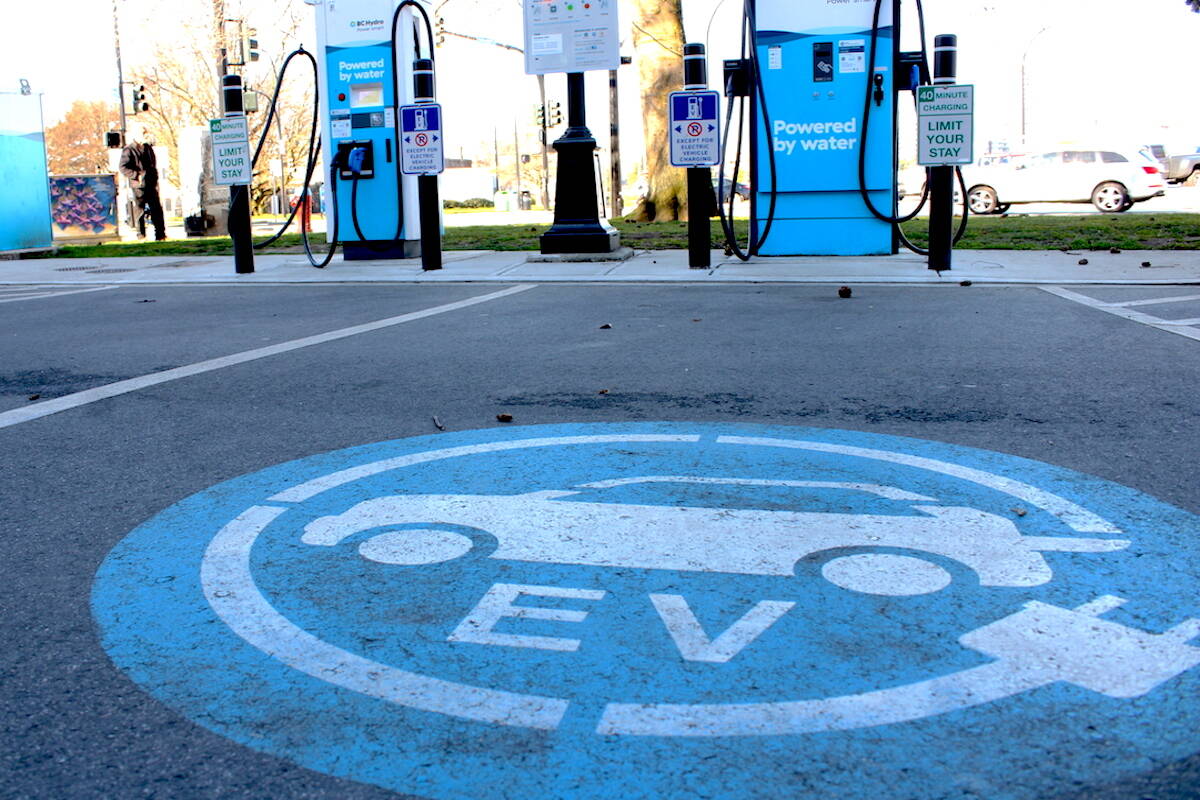A new report by a B.C. resource advocacy group is questioning the feasibility of the province’s plan to phase out all new gas vehicle sales by 2035.
Published by not-for-profit Resource Works on Tuesday (April 30), the report claims B.C. doesn’t have the infrastructure or power supply for its intended swift shift to zero-emission vehicles (ZEVs).
Under its CleanBC plan, the province has mandated that 90 per cent of new vehicle sales be ZEVs by 2030, increasing to 100 per cent by 2035. Zero-emission vehicles include battery-powered electric vehicles (EVs) and plug-in hybrid cars. B.C. says it will have at least 10,000 public chargers in place by 2030 to support the transition.
However, the author of Tuesday’s report, British Columbia Institute of Technology professor Jerome Gessaroli, said B.C. will require far more chargers to support a surge in ZEVs. Looking at the vehicle-to-charger ratio other jurisdictions have laid out, Gessaroli projected that B.C. will need around 40,000 public chargers by 2030.
He also noted the costliness of installing such chargers, which he said range from $8,000 to $150,000 per station. Gessaroli estimated chargers will cost British Columbians $1.8 billion by 2040 in total.
In a statement to Black Press Media, a spokesperson for the Ministry of Energy, Mines and Low Carbon Innovation noted that most EV chargers in the province are actually funded by the private sector, though. The ministry did not provide its own estimate on the cost to tax payers.
The spokesperson also did not respond to questioning around the discrepancy between the ministry’s charger goal and the estimated need laid out in Tuesday’s report.
READ ALSO: B.C. pressing the gas pedal on EV transition targets by 5 years
Beyond charging infrastructure, Gessaroli pointed to power supply as another issue.
He estimated ZEVs will demand an additional 2,700 gigawatt hours of electricity by 2030 and close to an additional 9,700 GWh by 2040. He also noted that B.C. has been forced to import electricity at times in recent years, such as in 2023 when drought conditions hit.
And, Gessaroli said, B.C. will have to upgrade power infrastructure to deliver the extra load of electricity. This will be especially challenging in older neighbourhoods, Gessaroli said.
BC Hydro’s own figures differ from Gessaroli’s, with the utility company projecting that ZEVs will increase electricity demand by only 1,000 GWh by 2030.
Minister Josie Osborne noted in a statement to Black Press Media that ZEVs make up less than one per cent of current energy demand and are expected to make up around three per cent by 2030. The province issued a call for new clean electricity proposals at the start of April, saying it’s looking to up annual output by 3,000 GWh – enough to power one million electric vehicles per year.
“This is just the start and will be the first in a series of calls – approximately one every two years – as B.C. needs more renewable power to build a clean economy and support growing communities,” Osborne said Tuesday.
READ ALSO: B.C. Hydro calls for new energy sources for the first time in 15 years
Gessaroli concluded that he believes B.C. is doing too much, too fast.
He said B.C.’s approach of restricting sales by automakers could result in driving up gas vehicle prices if they are suddenly only available in short supply. Gessaroli said if B.C. isn’t willing to rescind its ZEV mandates, it should follow an American approach instead.
In the U.S., automakers are required to meet overall emission standards rather than specific ZEV sales targets.
B.C.’s first sales goal comes in less than two years time, with a mandate that auto sales be 26 per cent ZEVs by 2026. Data collected by S&P Global Mobility suggests B.C. may already be meeting that initial milestone. According to the company, 26.4 per cent of new vehicle sales in B.C. in the final quarter of 2023 were either hybrid or electric.
B.C. will have to quadruple that percentage in the next decade to meet its 2035 mandate.
READ ALSO: More than 25 per cent of new cars sold in B.C. are electric: stats

